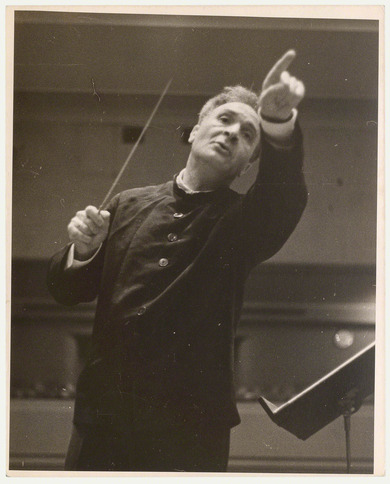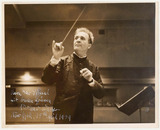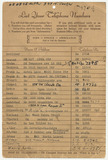Bruno Walter
So war mir Amerika schon vertraut, als ich im November 1939 zu dauerndem Aufenthalt hier eintraf, sprachlich machte mir die Verpflanzung keine Schwierigkeiten, nicht nur, weil ich englisch sprach, sondern vielmehr, weil ich mich als Musiker in meinem eigensten Idiom ausdrücken konnte, während z.B. Schriftsteller oder Schauspieler nicht englischer Zunge sprachlich und geistig in ihrem Beruf selbst behindert waren.
[I was already familiar with America when I arrived to stay in November 1939. The move was not a problem linguistically, not only because I spoke English but mainly because as a musician I could express myself in my most personal idiom, whereas writers and actors who weren't English-speakers were linguistically and intellectually hindered in their professions. (ed. trans.)]
Bruno Walter, Thema und Variationen: Erinnerungen und Gedanken, 1947
| Born | on 15 September 1876 in Berlin, Germany |
|---|---|
| Died | on 17 Februar 1962 in Beverly Hills, United States of America |
| Exile | Austria, Switzerland, France, United States of America |
| Profession | Conductor, Composer |
“You absolutely have to leave Germany today.” With these words, Elsa Walter convinced her husband, the conductor Bruno Walter, to flee from the Nazis in March 1933. Walter was supposed to conduct on 17 March in Leipzig, but the Nazis had threatened the organiser of the event to cancel it or face reprisals because Walter was a Jew. A few days later the same situation occurred in Berlin when Walter was to direct a concert with the Berlin Philharmonic. He left the German capital for Vienna on the same day as the cancellation of the Berlin Philharmonic concert.
In 1936 he took over as director of the Vienna Staatsoper. After the annexation of Austria, Walter found himself expelled from his place of work for the third time on account of his Jewish ancestry. In 1939, the conductor settled in Beverly Hills and met many other exiled artists – some of whom he had known for decades. In the 1920s, the writer Thomas Mann had been a neighbour of Walter's in Munich, and now they lived relatively close to each other in California. The writers Franz Werfel and Bruno Frank were among his friends. In 1946, Walter received American citizenship.
As he had already achieved international fame as a conductor before his emigration, his reputation helped him gain a foothold professionally in the US and he fielded offers from the largest orchestras in the country. Beyond the major symphonic repertoire, he focused primarily on the composer Gustav Mahler. Los Angeles and New York became his most important stages, though he also worked in other cities in the US and Canada.
As of 1946, Walter again performed regularly in Europe as well. After a heart-attack in 1957, he withdrew from the stage and concentrated on recordings, principally with the Columbia Symphony Orchestra, an ensemble created just for him.
Further reading:
Maurer-Zenck, Claudia: Arnold Schönberg. In: Maurer-Zenck, Claudia / Petersen, Peter (Hg.): Lexikon verfolgter Musikerinnen und Musiker der NS-Zeit, Universität Hamburg 2005ff
Ryding, Eric / Pechefsky, Rebecca: Bruno Walter. A World Elsewhere. New Haven, London: Yale University Press 2001
Walter, Bruno: Thema und Variationen. Erinnerungen und Gedanken. Frankfurt am Main: S. Fischer Verlag 1950



